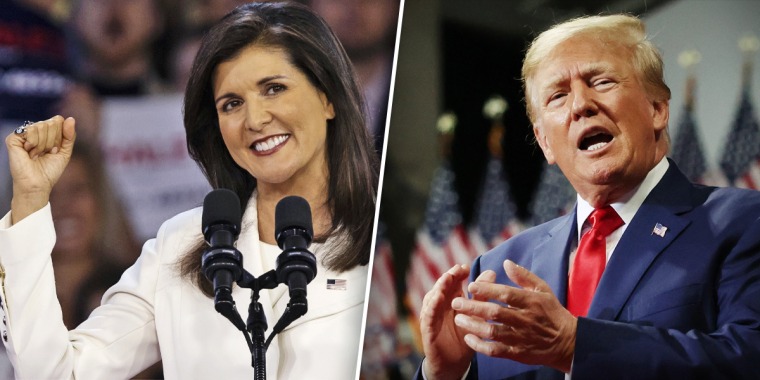CHARLESTON, S.C. — Republicans seeking the party's 2024 presidential nomination have so far ignored an issue that has been central to the conservative movement for decades: abortion.
On Wednesday, Nikki Haley made no mention of abortion policy in her presidential campaign launch speech in South Carolina. Former President Donald Trump, the front-runner in most polls, has also avoided the issue in his high-profile remarks as a candidate — his lengthy Nov. 16 speech launching his 2024 bid, his two Jan. 28 addresses in New Hampshire and South Carolina and his response to President Joe Biden's State of the Union speech.
Not only that, but Trump also never mentioned the Supreme Court or the judiciary in those speeches, an omission magnified by the fact that his role in reshaping the courts was arguably his biggest achievement in office. With the help of a Republican-led Senate, Trump appointed 234 judges, including three conservative Supreme Court justices instrumental to overturning Roe v. Wade.
Haley, a former U.S. ambassador to the United Nations who rose to power in South Carolina as a tea party-aligned conservative, signed abortion restrictions into law during her tenure as governor from 2011 to 2017 — a fact Democrats highlighted in response to her campaign launch.
The omission of abortion in key campaign speeches underlines a split within the Republican Party and the conservative movement about how to operate in a post-Roe world, now that proponents of abortion are more fired up. Some in the party prefer to downplay the issue, while others say GOP leaders must lean in and fight to restrict abortion.
"I think that'll be an issue in the primary," said Sen. Lindsey Graham, R-S.C., a Trump ally and author of a bill to ban abortion after 15 weeks. "If you're going to run for president in South Carolina and the Republican primary, you need to have a strong pro-life stance."
Graham said he doesn't make much of Trump's and Haley's avoiding abortion so far, arguing that there's plenty of time for Republican contenders to lean in: "That will come as the contest deepens."
Asked about candidates like Trump and Haley avoiding abortion in their campaign launches, Frank Cannon, a political strategist for the anti-abortion advocacy group Susan B. Anthony Pro-Life America, said: "It's a big mistake."
"Elections are always future oriented," Cannon said. "In the the first full election post-Dobbs, candidates will have to explain how they plan to protect unborn children nationally. No candidate regardless of their previous record will be the Republican nominee without articulating a vigorous defense of the right to life. Period."
Sen. Bill Cassidy, R-La., took a different view, saying the Supreme Court ruling "has made abortion a state issue," implying that Congress shouldn't use its newfound authority to restrict it nationally. He said blue states like New Jersey, New York and California can keep it legal.
"It is not a federal issue anymore," Cassidy said. "I want presidential candidates to talk about federal issues, which are actually going to make somebody's lives better. Not the rhetoric that's going to get people fired up but actually is like cotton candy and melts away."
The party division comes on the heels of an underwhelming midterm election for Republicans, in which abortion was the No. 2 issue for voters, as an NBC News national exit poll found. Those who cited it as their top concern in the 2022 contest preferred Democrats over Republicans by 53 points.
Abortion rights took center stage last fall after the Supreme Court overturned the federal right to access abortion, a landmark ruling conservatives fought for decades to achieve. But in the aftermath of the court's decision, Republicans scrambled to coalesce behind a coherent message about the issue and play down the prospects that Congress would restrict it nationally. Some GOP leaders, including Senate Minority Leader Mitch McConnell of Kentucky, sought to move the issue of abortion to the back burner.
Last month, Trump himself sought to place blame for midterm shortcomings on anti-abortion advocates who had pushed for tight restrictions with no exceptions for rape or incest or the life of the pregnant woman.
"It was the ‘abortion issue,’ poorly handled by many Republicans, especially those that firmly insisted on No Exceptions, even in the case of Rape, Incest, or Life of the Mother, that lost large numbers of Voters,” Trump wrote in a post on his Truth Social site.
That assertion was met with fierce pushback from advocates like SBA, which said in a statement at the time that candidates must “state clearly the ambitious consensus pro-life position and contrast that with the extreme view of Democrat opponents."
It's unclear how other prospective candidates will handle the issue in their campaigns, including whether to center it in their pitches to voters. Haley's campaign did not immediately respond to a request for comment.
Sen. Sheldon Whitehouse, D-R.I., said it "comes as no surprise" that Republicans like Trump and Haley have "dialed back" their rhetoric about abortion and the courts in the political arena.
"Those were much more popular issues [for Republicans] when they did not have results," Whitehouse said. "Once they had results, the issue got a lot smellier, because so many women realized what had been taken away from them and were furious about it."
He argued that any political advantage the GOP enjoyed on abortion and the courts in national elections is now diminished.
“It sure as hell isn’t what it used to be for them,” Whitehouse said.


